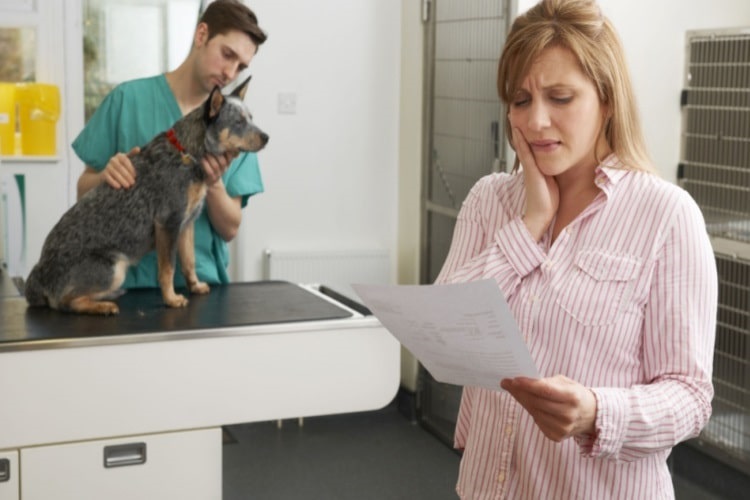Pet insurance may make the difference between a life-saving operation or saying goodbye to your best friend. Is pet insurance right for your family?
In This Article
What is Pet Insurance?
You have car insurance and insurance for your home or apartment, right? Pet insurance falls right in line. We always hope we never have to make a claim because that would mean we got into an accident, had a pipe burst, a fire, or worse yet, our pet got sick or hurt.
Sure, pet insurance can be that type of insurance, that oh goodness, something bad happened, and we need coverage. But it can also cover routine vaccines and preventative medications against heartworm disease, fleas, and ticks. So, pet insurance can be what you want it to be. It can be all-inclusive, covering almost anything from birth to passing, or it can be just for those unexpected, oh no occurrences.
Find the Cheapest Pet Insurance Quotes in Your Area
"*" indicates required fields
How Does Pet Insurance Work?

But how does pet insurance work? Some people simply take a set amount of their monthly paycheck and put it into a pet’s rainy-day fund. While others want the security of knowing that the insurance is there to cover them in their pet’s time of need. If you are the latter, then, by all means, keep reading.
Types of pet insurance policies
Generally, you can select from three general policy categories. Policies vary in coverage, premiums, and what they exclude. Plans can be of a wellness variety, illness coverage, accident coverage, or a combination thereof. But what does pet insurance cover? That really depends first on what plan you choose and each company’s individual policy subtleties. Generally speaking, we think of these plan options.
- Wellness coverage – Cover routine veterinary care, annual visits, vaccines, & preventatives
- Accident-only coverage – Covers for accidental injury or trauma
- Accident and illness coverage – Covers trauma or injury and includes medical illnesses such as GI disease, cancer, and other ailments.
Many companies will also have an all-inclusive type option that covers all three of the above.
You should also consider whether each plan includes coverage for unusual events like emergency boarding or third-party liability (in case your dog hurts another dog or a person).
How pet insurance works with your veterinarian
So, who pays the vet bill? Generally speaking, owners pay veterinarians up front after the pet receives care. Veterinary medicine functions as a fee-for-service type of business. But if you still have to foot the bill upfront, how do you get reimbursed? Most of the time, you file a claim with your insurance company after a visit. Some plans require a copy of the veterinarian’s records for that visit and any related visits pertaining to the claim. Some plans simply require a receipt of care and a claim form.
Is a Pet Wellness Plan the Same as Pet Insurance?
Many veterinarians now offer some variation of a comprehensive wellness plan package. Though each plan varies from vet to vet, this basically works like a membership service. You may pay annually or monthly. Commonly covered items include:
- Routine non-emergency veterinary appointments
- Vaccinations
- Heartworm (also intestinal parasite) prevention
- Flea/tick prevention
- Nail trims and even anal gland expression
- Some offer certain discounts on radiographs, yearly bloodwork screens, and routine surgical costs (dental cleanings, spay/neuter)
There may be additional coupons or perks as well. But again, this is not pet insurance, though these wellness programs provide an option to help with annual costs.
Sometimes people will participate in a wellness plan and have pet insurance to cover the non-wellness care. Suppose you subscribe to a wellness program, which affords discounts, but allows you to pay the veterinary care costs off over the year. In that case, you may consider adding an accident/illness plan that covers those unforeseen events.
Find the Cheapest Pet Insurance Quotes in Your Area
"*" indicates required fields
Pet Insurance Pros and Cons

There are pluses and minuses to buying pet insurance, and it’s not for everyone. But think of it like other insurance. Some people have disability insurance yet never use it, which is great. They have the protection and well-being of knowing it is there, just in case. But not having to use it means they weren’t injured or sick or in need of the coverage. Pet insurance works similarly.
Pet insurance benefits
- Backup that you need – Knowing that you have the backup you need helps you give your pet the care they deserve.
- Go to any vet you want – Thankfully, there are no HMO or referrals needed with pet insurance, so you can generally go to any vet you choose.
- Reimbursement can be up to 100% – You may recover as much as 100% of the cost you put down at the vet’s office for your pet’s care.
- Provided by many employers – Many employers now offer pet insurance as a job benefit along with human health insurance, sick time, vacation time, and a retirement plan.
- You can pick your coverage – You may just want annual wellness coverage or wish for all coverage possible. You can choose.
Pet insurance drawbacks
- Reimbursement may not be 100% – Pet insurance plans don’t usually cover 100% of care for 100% of the pet’s life. So out-of-pocket costs still may occur. The amount you get returned could be as low as 40%.
- Pre-existing conditions – Pre-existing conditions get people all the time. Unlike human healthcare in the U.S., pet insurance hasn’t done away with pre-existing conditions. If your pet has an issue already and you seek coverage, that issue likely won’t be covered. Additionally, if you switch insurance companies, you probably will not get coverage for a previously covered problem.
- Upfront payment – Generally, you pay your veterinarian and then submit an insurance claim. Reimbursement comes directly from the insurance company but must pay your vet upfront.
- May not need the coverage – As with any insurance, you pay for the protection for the ‘just in case’ scenario. So, hopefully, your pet doesn’t need anything. Still, you may not use the policy benefits throughout the pet’s life. But you gain that peace of mind; the coverage is there if you need it.
- Genetic conditions – All policies may not cover a pure-bred animal with known genetic disease risks. Ensure the policy covers them if they were to develop a hereditary disease.
Regardless of the benefits and disadvantages of pet insurance, before committing to any policy, always read the fine print.
Can I Use My Policy Immediately?
I signed up for a policy today. Can I use it instantly? This, too, will ultimately depend on the company and policy you select. But most of the time, there is a waiting period until you receive your insurance card and information, you are permitted to use the policy or both. So double-check with the plan ahead of time, so you aren’t caught off guard.
So Should I Get Pet Insurance?
This question can only be answered by you. Pet insurance isn’t right for everyone. The ideal time to buy insurance is when the pet is young or you first adopt the pet. No pre-existing conditions likely exist yet, and you have the pet’s lifetime to balance out payments.
Check out your options. Every day it seems a new pet insurance provider pops up. So, do your due diligence and research the various options. Make sure you evaluate multiple companies, multiple plan options, and pricing. Again, as much as we all hate reading the details, make sure you know what may or may not be covered ahead of time.
Watch the specifics of the plan you choose. Is the pet covered for life? Is there a maximum benefit allowed per condition covered? If you get another pet, would any discounts be provided were you to add that pet to a policy?
Once you decide yes, pet insurance is right for us, you will need to determine how much coverage you want – routine and preventative care, major medical (accidents, trauma, and the unforeseen), a combination thereof, or somewhere in the middle.
Remember, even if you have pet insurance, you still need to have the means to pay a bill in the short term. This could be via an everyday credit card, a check, or something like Care Credit, a credit card specifically used for healthcare expenses (human and animal). Or you may decide to put aside a few bucks each month for a pet rainy day fund to help you pay the vet until you get reimbursed.
Find the Cheapest Pet Insurance Quotes in Your Area
"*" indicates required fields
Final Verdict: A Vet’s Advice on Pet Insurance
Do I recommend pet insurance? You bet.
Veterinarians try to provide their clients with the best options to help their pets. Often, we don’t get to practice the gold standard, high-quality medicine we want because cost plays a role in the choices owners must face when deciding what they want to do for their pet’s care. Sadly, we don’t have the benefit of Medicare or Medicaid in animal medicine. Therefore, an owner’s budget plays a role in care options, something very frustrating to most veterinarians.
Pet insurance offers clients the means to treat their pets in the face of the unexpected and even helps them budget for the expected. But veterinarians understand pet insurance isn’t right for everyone, and having pet insurance doesn’t get you any better or worse treatment for your pet. It simply helps with the cost of care.
Shop around. Various websites allow you to compare plans, prices, and options. It seems like every time I look, yet another company offers pet insurance choices. So, you have some research ahead of you. But if insurance is right for you and your family, you want to ensure you get the best coverage for your situation and needs at the right price.
This article’s material came from the author’s expertise and the following resources.123
Article Sources
Pets Digest uses only high-quality sources, including peer-reviewed studies, to support the facts within our articles. Read our editorial process to learn more about how we fact-check and keep our content accurate, reliable, and trustworthy.
- Rachel N. What is a vet pet health plan? Vet Help Direct. Published August 4, 2021. Accessed August 5, 2022. https://vethelpdirect.com/vetblog/2021/08/04/what-is-a-vet-pet-health-plan/
- Calonia J. 5 Pros and Cons of Pet Insurance — Is It Worth It? The Financial Gym. Published 2019. Accessed August 5, 2022. https://financialgym.com/blog/2019/7/5/5-pros-and-cons-of-pet-insurance-is-it-worth-it
- National Association of Insurance Commissioners (NAIC). Pet Insurance. NAIC. Published May 11, 2022. Accessed August 8, 2022. https://content.naic.org/cipr-topics/pet-insurance


